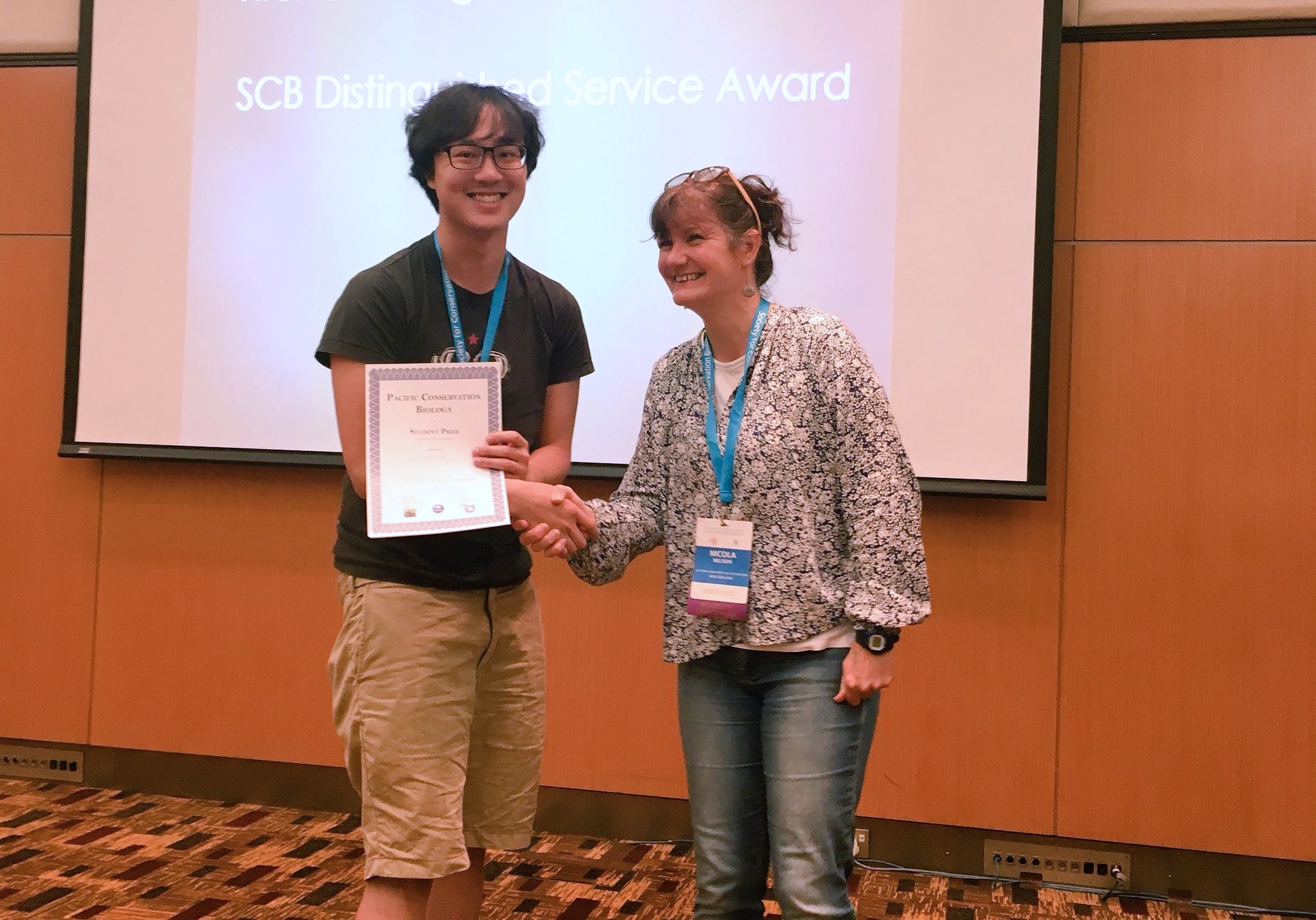We are pleased to announce the winners of our 2019 SCB Oceania student awards. Thanks to everyone who nominated – once again there was a very competitive field with some fantastic conservation research being undertake by our student members.
The 2019 SCBO Student Presentation Prize is awarded to Diana Sofia López-Cubillos for her ICCB presentation: Crop expansion or active restoration? Using pollination services for economic development and habitat conservation. Diana wins free registration to the next SCBO conference, or one year SCB membership.
Abstract: Pollinators are currently facing dramatic declines in abundance and richness. This can have profound impacts on agriculture, as 75% of crops benefit from pollination services. Native bees depend on natural areas for nesting and flowering sources; therefore, restoring natural areas within croplands can be beneficial for biodiversity and economic development. Despite the advantages, restoration faces implementation challenges, as it typically requires upfront costs and taking some land out of production. Designing sustainable landscapes in this context will require novel approaches, but there is limited knowledge and tools for how to include the potential of pollination services in spatial restoration planning. Here, we develop a systematic planning framework to determine the best locations for restoration that account for the improved yields delivered by pollination services. We demonstrate the potential of this framework to improve land-use decisions in a coffee production landscape in Costa Rica across a range of scenarios. Our work quantifies the extent to which restoration can provide synergies between agricultural production and conservation, and determines if payments for ecosystem services are ultimately required to deliver sustainable landscapes. Our results illustrate that restoration can provide economic benefits in the long run, which can serve as a tool for engaging local land-holders in conservation endeavours which also enhance their livelihoods.
The 2019 CSIRO / Pacific Conservation Biology Presentation Prize is awarded to Calvin Lee for his presentation: Using detection probability to improve time-series analyses of remote sensing data. Calvin wins a $250 CSIRO book voucher.

Abstract: Satellite remote sensing is increasingly used as a method of large-scale monitoring in ecology and conservation. Much attention has been given to land-use or land-cover change studies using only a subset of ‘best’ images at coarse temporal resolutions. These methods limit our ability to represent uncertainty in the detection and classification process, discarding substantial amount of data. Conventional statistical approaches in ecology, such as occupancy-detectability models, explicitly model errors in their estimates but have not yet been applied to remote sensing problems. Using mangroves as our study ecosystem, we applied a statistical method to take detection probability into account, explicitly quantifying uncertainty within area estimates calculated from all satellite images available within our region of interest from 1982 onwards. This method takes covariates that can affect ecosystem detectability (e.g. including sensor type, number of sensors, cloud cover, time of year, modelling algorithm) into account. By taking advantage of the full temporal suite of satellite data available across multiple sensors, we produce areal trends of ecosystems with explicit uncertainty. The results can be used in time-series analyses and models that investigate the drivers of ecosystem area trends. They will be applicable for ecosystem risk assessments, such as the Red List of Ecosystems, allowing more accurate Red List classifications and a means of investigating pathways to collapse.
The 2019 SCBO Student Paper Prize is awarded to Stephanie Galla and Natalie Forsdick for their joint first-author paper: Reference Genomes from Distantly Related Species Can Be Used for Discovery of Single Nucleotide Polymorphisms to Inform Conservation Management. Stephanie and Natalie win free registration to the next SCBO conference, or one year SCB membership.
Galla SJ, Forsdick NJ, Brown L, Hoeppner MP, Knapp M, Maloney RF, Moraga R, Santure AW, Steeves TE. Reference Genomes from Distantly Related Species Can Be Used for Discovery of Single Nucleotide Polymorphisms to Inform Conservation Management. Genes. 2019; 10(1):9.


